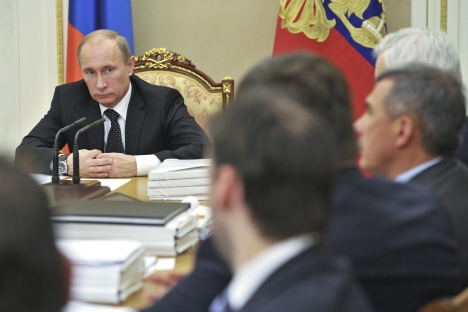Putin moves to win over startup entrepreneurs

Russian President Vladimir Putin during a session of the Agency for Strategic Initiatives at the Kremlin held in Moscow on Nov. 22. Source: Reuters / Vostock Photo
In an attempt to boost his support among Internet audiences, Russian President Vladimir Putin has called for the creation of a state-run foundation to finance the most promising online startups of high social value.
“Online resources instantly attract hundreds of thousands, or even millions, of users around the world,” Putin said at a meeting of the supervisory board of the Agency for Strategic Initiatives on Nov. 22. “We have a lot of young people with interesting ideas ‒ a lot of talented programmers ‒ including public activists, who can implement these ideas or use them in their work.”
Related:
Start-ups to look out for in the next few years
The president suggested establishing a foundation that would “select online initiatives, and finance those that have high social value and address socially important issues.”
The concept for the new foundation will be ready in February. So far, the concept could be best described as “a stock exchange for Internet projects,” said General Director of the Agency for Strategic Initiatives Andrei Nikitin.
“If people vote for a project with their money (for example, through crowd-funding), the state will add a certain amount,” Nikitin said at a press briefing following the meeting with Putin. “We won’t finance projects that haven’t been supported by people.”
President Putin emphasized that the foundation will create jobs for “the creative class of young people.”
“Things look bad,” Director of the Young Professionals Department at the Strategic Initiatives Agency, Dmitry Peskov, told Business FM. “Young talented people can’t find sources of funding in Russia, and they leave – we’re exporting talents and potentially big businesses. We need to create support mechanisms for future businesspeople in Russia.”
Peskov told RBC Daily that the new foundation will co-fund projects for distant learning, social services and urban environment. “Startups in entertainment and clones of Western online stores” are outside of the foundation’s realm of interest, he said.
“The foundation’s capitalization and the extent of state support have not been determined yet,” Peskov told RBC Daily. “The idea is to finance several thousand projects. Assuming that each will require somewhere between 100,000 rubles ($3,200) to several million rubles, a total of several billion rubles will be needed.”
The director for social projects with the Agency for Strategic Initiatives, Vladimir Yablonsky, told Gazeta.ru that the agency is already considering a set of Internet projects that the new foundation could sponsor in the future. “The idea is to create services for people,” Yablonsky said. “They can be both profit-oriented and charitable, and feature both services one has to pay for and those free of charge.”
Yevgeny Gordeyev, managing partner at Russian Ventures, told Gazeta.ru that the foundation may give a boost to important social projects that would not be funded otherwise. “Such projects may be of little interest to venture funds, as they don’t necessarily generate revenues, but they can become useful to the state,” he said.
Some of the Internet experts are skeptical about the president’s initiative. “Everything good that happened in the Russian segment of the Internet happened not thanks to the government, but when the government’s involvement was the smallest,” Anton Nosik, media director of SUP Media, told Kommersant.
Nosik is certain that the foundation will sponsor pro-Kremlin youth movements “Nashi” (Ours) and “Molodaya Gvardia” (The Young Guard), rather than oppositionist Alexei Navalny’s anti-corruption project Rospil, for instance.
In an interview with Firstnews, Nosik pointed out that, in 2002, the government launched the e-Russia federal program to move government services online, although little progress has been made in this area.
“To get a passport for traveling abroad, I still need to submit copies of documents to the government body that issued these documents,” said Nosik.
Political analyst Dmitry Oreshkin believes that Vladimir Putin is setting up a heavily funded body that “will support projects he likes and oust or outbid everyone else for projects he doesn’t like.”
“Putin realized that the Internet is becoming a powerful tool he doesn’t control,” Oreshkin told Kommersant. To bring the Internet under control, the government is using both sticks and carrots.
“They can ban a site over extremist comments,” Oreshkin said. “But, besides sticks, they’re offering carrots – money for maintaining Kremlin-friendly sites. Vladimir Putin is one of those who thinks that money talks.”
The story is based on materials from Gazeta.ru, Kommersant, Business FM, Firstnews, RBC Daily and Prime news agency.
All rights reserved by Rossiyskaya Gazeta.
Subscribe
to our newsletter!
Get the week's best stories straight to your inbox